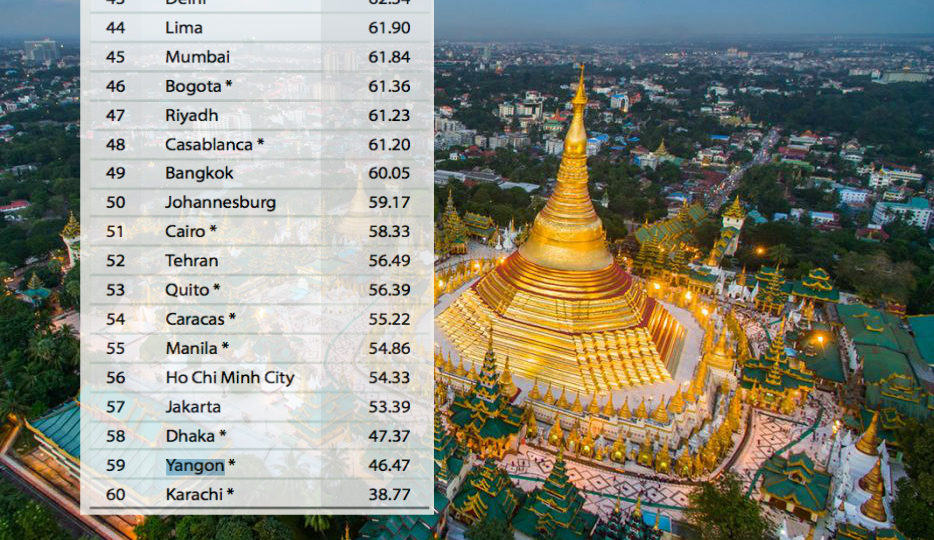Yangon was ranked second to last in the Safe Cities Index 2017, released this week by The Economist Intelligence Unit. Myanmar’s biggest city suffers from low investment in health and infrastructure, poor management, and threats from traffic, terrorism, and climate change. According to the report, only Karachi, Pakistan, is a more dangerous place to call home.
The Safe Cities Index ranks 60 cities based on 49 indicators covering digital security, health security, infrastructure security, and personal security. The data are also supplemented by wide-ranging research and in-depth interviews with experts in the field, according to the authors. Each city receives a score between zero and 100 in each category, in addition to an overall score.
The Economist Intelligence Unit released its 2017 Safe Cities Index. 1 Tokyo, 2 Singapore, 3 Osaka, 4 Toronto… https://t.co/machqVZME5 pic.twitter.com/Lw06AyIfGI
— xraytext (@xraytext) October 12, 2017
Digital security
Yangon’s penultimate ranking was largely a consequence of its status as a low-income city. In the digital security category, the city scored 39.07 out of 100. The report said Yangon and other low-income cities are unable to prioritize protection against cyber threats because they are preoccupied with other challenges, like infectious disease and poverty.
Yangon’s vulnerability to cyber threats was exposed several times this year when a state-run newspaper and several government websites were hacked.
Health security
In the health security category, Yangon scored 45.79 – higher only than Dhaka and Karachi. These cities, too, struggle as a result of being poor. However, income is not the only determinant of health security; only two of the top 10 cities in this category (Tokyo and Zurich) are high-income cities. Yangon’s low health security, according to critics, is result of how the Myanmar government allocates its resources. More than of its annual budget is granted to the military, while the ministries of health and education, which would contribute most to health security, get a combined 13 percent.
Infrastructure security
Yangon earned a score of 48.58 in the infrastructure security category, again only beating Dhaka and Karachi. This is a result of both low investment into infrastructure and poor governance, management, and regulatory frameworks relating to infrastructure. Management is sometimes so poor that investment in infrastructure comes at the expense of Yangon’s inhabitants. In June, the regional government demolished the homes of thousands of unregistered residents of Hlegu Township to make way for a new high-rise housing complex, leaving them homeless.
Yangon’s infrastructure security score was also brought down by its vulnerability to climate change. The city has the 15th highest number of deaths from natural disasters per year among the 60 cities on the list.
Personal security
Although Yangon is seen by many who live here as relatively safe in terms of the risks crime and injury, the city scored worse (52.43) than every other city in personal security category, except for Ho Chi Minh City, Caracas, and Karachi.
Yangon had the 17th highest number of injuries and casualties caused by terror attacks between 2007 and 2016, and the city’s traffic is getting increasingly deadly. Hundreds of people die in road accidents every month, and year-end death tolls get higher every year. A report released by the Yangon Police Force covering the first half of 2016 said there were 96 rape cases, 93 murders, 26 robberies, and 3 thefts in the city.
Yangon and Karachi were among the 10 new cities added to the index this year. Jakarta, Indonesia, took last place in the previous index in 2015, but even though its indicators worsened over the last two years, Yangon and Karachi bumped it from the bottom of the list this year.
Check out the full report here.




